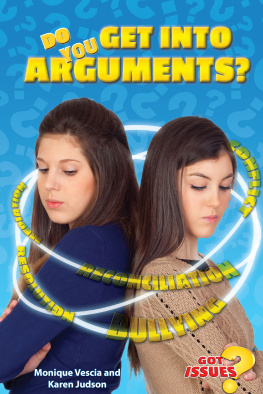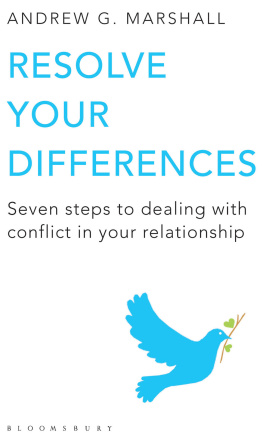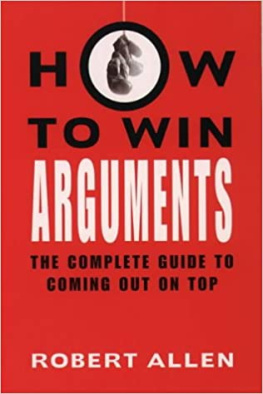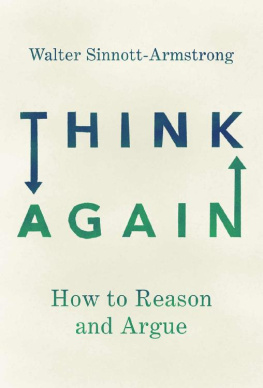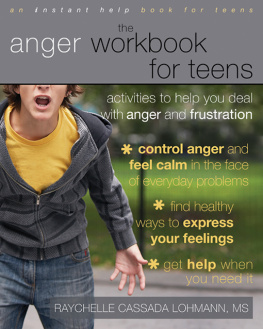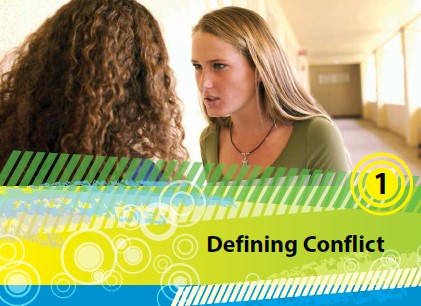Enslow Publishing
101 W. 23rd Street Suite 240
New York, NY 10011 USA
Monique Vescia and Karen Judson
Published in 2016 by Enslow Publishing, LLC.
101 W. 23rd Street, Suite 240, New York, NY 10011
Copyright 2016 by Karen Judson
Additional materials copyright 2016 by Enslow Publishing, LLC.
All rights reserved.
No part of this book may be reproduced by any means without the written permission of the publisher. Library of Congress Cataloging-in-Publication Data
Vescia, Monique.
Do you get into arguments? / Monique Vescia and Karen Judson.
pages cm. (Got issues?)
Audience: Grade 9 to 12.
Includes bibliographical references and index.
Summary: Describes difficulties facing teens today concerning anger, misunderstandings, and tempers Provided by publisher.
ISBN 978-0-7660-7189-6
1. AngerJuvenile literature. 2. TemperJuvenile literature. 3. Miscommunication. I. Judson, Karen, 1941- II. Title.
BF575.A5V47 2016 155.5T247dc23
2015028086
Printed in the United States of America
To Our Readers: We have done our best to make sure all websites in this book were active and appropriate when we went to press. However, the author and the publisher have no control over and assume no liability for the material available on those websites or on any websites they may link to. Any comments or suggestions can be sent by e-mail to .
Portions of this book originally appeared in the book Resolving Conflicts: How to Get Along When You Dont Get Along.
Disclaimer: For many of the images in this book, the people photographed are models. The depictions do not imply actual situations or events.
Photo Credits: Cover, p. 3 Gelpi JM/Shutterstock.com; p. 7 Stockbyte/Thinkstock; p. 8, 28 Monkey Business Images/Shutterstock; p. 11 Jan Tyler/iStock/Thinkstock; p. 22 AP Images; p. 25 Morton Broffman/Archive Photos/Getty Images; p. 31 Catherine Yeulet/iStock/Thinkstock; p. 32 Highwaystarz-Photography/iStock/Thinkstock; p. 34 Jupiterimages/Creatas/Thinkstock; p. 39 iStockphoto.com/ caracterdesign; p. 41 Sabphoto/Shutterstock.com; p.43 Kzenon/Shutterstock.com ; p. 45 iStockphoto. com/Rob Mattingley; p. 46 oliveromg/Shutterstock.com; p. 51 Ace Stock Limited/Alamy; p. 54 iStockphoto.com/Steve Debenport; p. 58 iStockphoto.com/sturti; p. 63 Odd Andersen/AFP/Getty Images; p. 66 Time Life Pictures/Mansell/The LIFE Picture Collection/Getty Images; p. 69 Jennifer Bruce/AFP/Getty Images; p. 73 AP Photo/The Daily Reflector, Jenni Farrow; p. 79 Photographee. eu/Shutterstock.com; p. 82 Susan Biddle/The Washington Post/Getty Images; p. 84 David Young-Wolff / PhotoEdit; p. 86 iStockphoto.com/franckreporter; p. 90 Purestock/Thinkstock; p.93 @erics/ Shutterstock.com; p. 95 Andrei Jackamets / Bravo / Courtesy: Everett Collection; p. 97 Photofusion/Universal Images Group via Getty Images; p. 100 Nicole Weiss/Shutterstock.com; p. 102 Sylvie Bouchard/Shutterstock.com; p. 104 RypeArts/Shutterstock.com; p. 107 Gail Hardy/iStock/ Thinkstock; p. 109 Stokkete/Shutterstock.com.

Some of the names in this book are fictional, but the stories come out of the author's own experience as a parent and teacher. All of the words, feelings, and situations described are based on real people's experiences with conflict and conflict resolution.
D o you find yourself getting into arguments with your friends and family or even strangers? When something doesnt go your way, do you take it out on those around you? Do you have trouble dealing with people whose opinions differ from yours? Do you pick fights? If so, you may find that you have trouble with conflict.
What is conflict? It may be as minor as two bargain hunters squabbling over the same item on a sale rack or as major as two nations going to war. Sometimes conflicts begin over something insignificant and balloon into something far more serious. Most people experience some degree of conflict every day. As a teenager, you may feel like youve had more than your share. Chances are you often find yourself in a conflict with a parent, teacher, sibling, or even with a best friend.
Imagine the following conflict scenarios:
You found out that one of your friends is dating the guy who just broke up with you, and you feel betrayed by both your friend and your ex-boyfriend.
Your parents refuse to let you go camping with a group of your friends because the group consists of both boys and girls, and you are angry because you think your parents do not trust you.
It is frustrating that even though you have just earned your drivers license, your father will not let you take the car by yourself.

Do you get into arguments with your parents? Conflicts can arise when children and parents have different ideas. Maybe you disagree about your curfew or the amount of your allowance.
You have been looking forward to the prom for months, but now it is only two weeks away and your boss will not give you time off.
A customer where you work blames youunjustly and loudlyfor shortchanging her.
For the third time this month your girlfriend stands you up.
You got a ticket for speeding that you feel you did not deserve, and when you tried to talk the police officer out of it, he got angry.
A friend invited you to see a movie, but you lied and said your parents would not let you go. The truth was that you thought someone you have a crush on was going to ask you to the same movie, and you wanted to be free to accept that invitation. The person you lied to now seems to dislike you, and you feel guilty.
Everyone experiences conflictfrom the president of the United States (of course, his or her job is handling conflicts) to kids in kindergarten (remember when you and another five-year-old fought furiously over the crayon you both wanted?).
Conflicts can arise as we interact with strangers, family members, employers, authority figures, acquaintances, friends, members of groups we belong to, and others. Maybe you and your parents do not agree on your choice of friends. Or perhaps the basketball team you play on cannot agree on which player to elect as team captain. Some conflicts cause a stronger emotional response than others. It would probably be more difficult, for example, to resolve a conflict with your parents over your choice of friends than to decide which teammate to elect.
We tend to think of any kind of conflict as hurtful, but a personal conflict is not always wrong and does not always involve an angry confrontation. A life totally without conflict might sound desirable, but it would most likely become boring.
Life is interesting because it is filled with surprises, expectations, disappointment, and conflict. On the other hand, sometimes conflicts lead to hostility and worse, and if not resolved, they can make life miserable for everyone involved.

